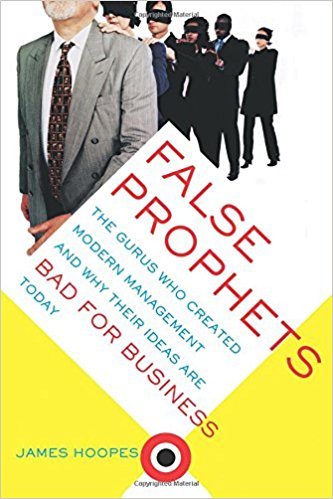False Prophets Summary

5 min read ⌚
 The Gurus Who Created Modern Management and Why Their Ideas Are Bad for Businesses Today
The Gurus Who Created Modern Management and Why Their Ideas Are Bad for Businesses Today
Americans have always strived toward building a democratic, egalitarian country. However, managers and management gurus have somehow figured out a way to “deceive” the public and vend the country to corporate associations.
Who Should Read “False Prophets”? And Why?
Do not be fooled by this book’s title – despite the sound of it; it does not say much of modern business environment and management.
Instead, it mostly concentrates on personal and professional profiles of management theorists whose theories emerged during the twentieth century.
Although authors focus mainly on the picked eight theorists, it also ads a little detail about the important management ideas that played an essential role in shaping contemporary enterprises.
This aspect adds more relevance to this historically oriented book.
Hence, if you would like a more practical approach to management’s how-to, then you better skip this book. On the other hand, we recommend “False Prophets” mostly because of the story-value it holds.
It will make you attentive towards managing consultants and will make you familiar with some of the most prominent management theorists.
About James Hoopes
 James Hoopes is the author of several books, on subjects ranging from business history to American political theory, among which are Community Denied and Consciousness in New England.
James Hoopes is the author of several books, on subjects ranging from business history to American political theory, among which are Community Denied and Consciousness in New England.
He teaches Business Ethics at Babson College.
“False Prophets Summary”
These organizations did that by cleverly hiding how much authoritarian control corporate organizations underpin, and additionally, by belligerence that such power is freeing. On the one hand, societies hold a defensive stance on civil rights.
On the other hand, however, enterprises can restrict the freedom of speech, can underpay, fire in spite of satisfying performance, and don’t respect the rights of their employees.
So, why do workers endure such working conditions? The answer is simple: for money, status, and because there are no longer any options left, where they can find better employment.
You have probably heard consultants and management experts discuss team building, empowerment, flat associations. The truth of the matter is that control is fundamental to the enterprise: the undemocratic, autocratic control.
Management power and control is necessary for democracy since it is gullible to assume that the company could be democratized and still efficiently produce goods.
The ancestry of the American business is slavery, and the ancestors in the evolution of the corporations are slaveholders. In all honesty, the knowledge of slaveholders is of great importance to current corporate supervisors.
First of all, markets and market power guided the administrative practices of slavers. At the point when the cost of slaves was relatively low concerning cotton costs, it seemed well and good to work slaves to weariness and then supplant them with others.
Conversely, when slave costs rose, or cotton costs fell, monetary rationale justified taking care of slave’s strength and life by better diet, more sleep et cetera. However, slaves were not machines. Thus the choice about how hard they could work was not solely up to the proprietor.
Cooperation between slaves was essential, and soon clever slaveholders discovered that practicing punishments was not the best type of motivation.
This new, edified state of mind did not continually reach out to the supervisors, who were the middle managers of the slave society. Imprisoned between slaves at the bottom and planters at the top of the society’s pyramid, with no expectation of ever accomplishing freedom, managers felt less secure than slaves.
Overseers were to blame whenever the performance fell short, and planters promptly dismissed them even though in reality, the performance goals they set in the first place were high enough.
To solve this, masters undercut the supervisor’s’ power by opening direct channels of communication with the slave ranks.
Most of the time, estates required managers between the supervisors and the slave ranks. These managers in the middle were slaves elevated to the position of “driver.” Of course, the job had its advantages such as a superior house, a better diet, finer garments and more cash to spend.
Their responsibility was to influence the other slaves to buckle down. From the slave’s perspective, a great driver was one who did his best to be reasonable under the sickening conditions.
Key Lessons from “False Prophets”
1. The Personalities Who Launched Management Theory: Frederick Winslow Taylor
2. Those Who Launched Management Theory: Mary Parker Follett
3. The Personalities Who Launched Management Theory: Chester Barnard
Frederick Winslow Taylor
Taylor was an audacious adversary of the system. He prevailed with regards to breaking administration that made supervisors wealthy and urged employees to daydream.
In the quest for profitability, he developed machines and administrative frameworks that treated workers like machines. Utilizing time and motion contemplates, he added high levels of detail to work rules.
This system made it feasible for directors to prepare for worker substitution. Taylor argued that scientific management is a union of workers and managers where both could profit.
However, his theory did not work in practice. Management and business owners changed payment levels to hold laborer income low.
Mary Parker Follett
He perceived organizations as a person, not merely in law, but in spirit also. Furthermore, she saw the company as a system to tie employees together in unity, which as a whole was more significant than the sum of its parts.
Additionally, she acknowledged the reality of administrative power, yet encouraged supervisors to see laborers not as machines but rather as natural parts of the corporate organism.
She preached that directors ought to motivate and inspire laborers’ collaboration, instead of constraining it.
Chester Barnard
Chester was the following colossal name to advocate a style of administration adjusted more to human relations, psychology and community compared to financial aspects.
He inferred that power flows from the base up and chiefs ought to stop giving orders, but should instead try to influence their workers.
Like this summary? We’d Like to invite you to download our free 12 min app, for more amazing summaries and audiobooks.








